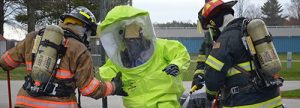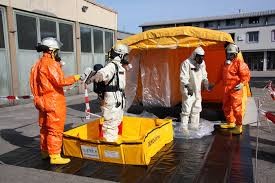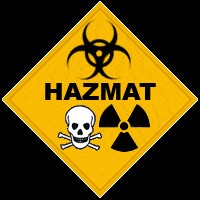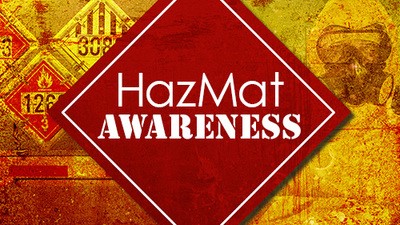Project Description

Why attend
Hazardous materials and chemicals are ubiquitous as air, carbohydrates, enzymes, lipids, minerals, proteins, vitamins, water and wood. Naturally occurring hazardous materials and chemicals are supplemented by man-made substances. There are about 70,000 chemicals in use with another 500-1000 added each year. Their properties have been harnessed to enhance the quality of life, thus chemicals are found in virtually all workplaces. Besides the benefits, chemicals also pose dangers to man and the environment. Society must strike a balance between the benefits and risks of hazardous materials and chemicals. In the workplace it is a management responsibility to ensure practices control the dangers, and it is for employees to collaborate in implementing the agreed procedures. Management must also prevent uncontrolled environmental releases and ensure all wastes are disposed of safely and with proper regard for their environmental impact. The aims of this course are to raise awareness and to help participants identify, assess and control the hazards of chemicals and other hazardous materials to permit optimum exploitation whilst minimizing the dangers.

Course Objectives
By the end of the course, participants will be able to:
Apply proper techniques in hazardous material handling (HAZMAT) and hazardous material communication (HAZCOM) including handling, storage, disposal, monitoring, response, MSDS and spill clean-up of hazardous materials and chemicals.
Discuss the physic chemistry of vapour pressure, gas-liquid solubility, density differences of liquids, surface area effects in mass transfer or heterogeneous reactions and chemical reaction kinetics.
Recognize the hazards of toxic chemicals including its types, risk control and specific precautions.
Employ control measures for flammable chemicals and prevent hazards arising in reactive chemicals processing.
Enumerate the various cryogens, compresses gases and radioactive chemicals including its characteristics.
Carryout proper monitoring techniques for environmental pollution, gases, vapours, particulates, water quality, sampling strategies and incident investigation.
Apply effective operating procedures for the commissioning, operation, maintenance, spillage, personal protection and monitoring standards of hazardous chemicals.
Identify the classification, packaging, labelling and specific information for marketing hazardous chemicals.
Employ the safe transport of chemicals by road, rail, air & sea and determine the modes of transport for liquids, gases and solids.
Acquire knowledge on the monitoring and protection of chemicals and the environment including the legislative control governing these chemicals, proper waste management and environmental impact assessment.
Who should attend
This course is ideal for either for Emergency Services personnel who are or may be involved in the management of search incidents or new employees who may, in the course of their normal duties, be called upon to take up a position in their company’s emergency response organisation. Alternatively, the course would suit anyone within the company who wishes to understand the principles of rescue activities.
Course Outline
Recognize the specific laws and regulations- Hazardous Materials Management Principles – Physical and Chemical Properties of Materials- Toxicology and Risk Assessment-Environmental Fate of Hazardous Materials-Legal and Regulatory Framework
Hazard Recognition -Types of Toxic Chemicals – Hazard Assessment – Risk Assessment of Carcinogens – Risk Control – Control of Substances Hazardous to Health – Specific Precautions – MSDS
Ignition and Propagation of a Fame Front – Control Measures – Fire Extinguishment – Fire Precautions
- Water-Sensitive Chemicals –
- Toxic Hazards From Mixtures –
- Reactive Hazards from Mixtures –
- Oxidizing Agents – Explosive Chemicals –
- General Principles for Storage –
- Hazards Arising in Chemicals Processing
- Oxygen – Liquid Nitrogen and Argon –
- Liquid Carbon Dioxide – Liquefied Natural Gas
- Acetylene – Air –
- Ammonia –
- Carbon Dioxide –
- Carbon Monoxide –
- Chlorine – Hydrogen –
- Hydrogen Chloride –
- Hydrogen Sulphide –
- Liquefied Petroleum Gases –
- Methane –
- Nitrogen – Nitrogen Oxides –
- Oxygen – Ozone –
- Sulphur Dioxide
- Selected General Analytical Techniques for Monitoring Environmental Pollution –
- Gases and Vapours – Particulates – Monitoring Water Quality – Monitoring Land Pollution – Monitoring Air Pollution
- Flammable Gases – Toxic Particulates – Official Methods – Sampling Strategies –
- Selected Strategies for Determining Employees’ Exposure to Airborne Chemicals – Pollution Monitoring Strategies in Incident Investigation
Hazards – Types of Radiation – Control Measures

The workshop
This interactive training course includes the following training methodologies as presented on the next column based on percentage of the total tuition hours:
Lectures
Workshops & Work presentation
Case Studies & Practical Exercises
Videos, Sofware & General Discussion
The course instructor may modify the above training methodology before or during the course for technical reasons with no prior notice to participants.
Falcon Consulting Professionals is established in Greece for the last 15 years in the areas of technical consulting and professional training for the local industries. Falcon is expanding in GCC, aiming to provide the best consulting and training solutions to the industries of the region. Falcon’s instructors are accredited trainers and highly experienced in their fields, as well as adult training. We aspire to build our business relationships on mutual trust. The achievement of results with an emphasis on innovation and sustainability, quality, cost analysis and time scheduling are non-negotiable from the conceptual phase of the training.

